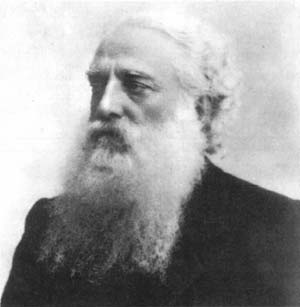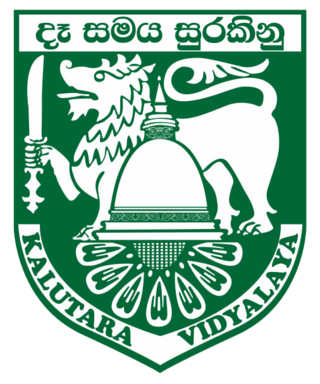
Colonel Henry Steel Olcott was an American military officer, journalist, lawyer, Freemason and the co-founder and first president of the Theosophical Society.

Maliyadeva College is a national school controlled by the Sri Lankan central government. It is located in Kurunegala, Sri Lanka, and was established in 1888 by the Buddhist Theosophical Society, led by Colonel Henry Steel Olcott. It is one of Sri Lanka's oldest schools. Today, the school accommodates 5,000 students. The term "Devans" is used to refer to the former and present pupils of Maliyadeva College.

Mahinda College is a Buddhist boys' school in Galle, Sri Lanka. The school was established on 1 March 1892 by the Buddhist Theosophical Society led by Colonel Henry Steel Olcott. As of May 2022 it is a national school providing primary and secondary education across 13 grades.

Patrick de Silva Kularatne was a Sri Lankan educationist and politician. He was a Member of the State Council of Ceylon (1942-1947) and Member of Parliament (1960-1965). He served as Principal of Ananda College and Dharmaraja College and established Nalanda College Colombo, Ananda Balika Vidyalaya, Moratuwa Vidyalaya and Dharmapala Vidyalaya. As a member of the executive committee on Education, he played an instrumental role in the realisation of free education from kindergarten to university.

Sujatha Vidyalaya is a girls' school situated in Matara District, the southernmost district of Sri Lanka. Founded by the Matara Buddhists' Society as a private Buddhist institution in 1929, it is among the oldest Buddhist schools in the country. Today, the Government of Sri Lanka operates Sujatha Vidyalaya as a National School, having been part of the initial group of schools to receive this designation.

Panadura is a city in Kalutara District, Western Province in Sri Lanka. It is located approximately 27 km (17 mi) south of Colombo and is surrounded on all sides by water; the Indian Ocean, the Bolgoda Lake and river. Panadura is famed as the location of important events in the Buddhist revival movement of Sri Lanka.

Dharmasoka College is a coed school in Sri Lanka. The college was established in 1913.
Ambalangoda is a coastal town located in Galle District, Southern Province of Sri Lanka. Governed by Ambalangoda Urban Council, the town is famous for its ancient demon masks and devil dancers. Situated approximately 87 kilometres (54 mi) south of Colombo, it sits on an elevation of 13 metres (43 ft) above the sea level.

Dharmapala Vidyalaya, Pannipitiya, established in 1942 on land owned by Anagarika Dharmapala, is the largest mixed school in Sri Lanka with about 8000 students and 600 academic staff. It is a public school and provides primary and secondary education.
The Henry Steel Olcott Memorial Cricket Tournament is conducted annually among the past cricketers of eight premier Buddhist schools in Sri Lanka in honour of Col. Olcott, the founder of Buddhist education in Sri Lanka. The organising function in each year is rotated among each the participating Old Boy Associations
Kulrathna Maha Vidyalaya also known as P. De S. Kularathna Vidyalaya is a mixed school in Ambalangoda, Sri Lanka. The school was established in 1986 by Dayawansha Ginige who was the founder principal of the school. The school is named after the famous Sri Lankan educationist Patrick de Silva Kularatne. Presently Kulrathna Maha Vidyalaya provides primary and secondary education to a student population of over 3000.

Musaeus College is a Buddhist private girls' school in Colombo, Sri Lanka. The school is named after its founding principal, Marie Musaeus Higgins from Wismar, Germany, who served as the school's principal from 1891 to 1926. Musaeus College provides primary and secondary education to more than 6,500 girls from ages 3 to 18, and is managed by a board of trustees. The school's motto is "Follow the Light".

Kalutara Vidyalaya is a Buddhist boys' school in Kalutara, Sri Lanka. The college was founded in 1941 by Sir Cyril de Zoysa. It is a national school providing primary and secondary education.

Daluwatte Hewa Buddhika Kurukularatne was a journalist, author, lawyer, and Sri Lankan politician. He served as representative of Galle District for the United National Party in the Parliament of Sri Lanka.

Henry Woodward Amarasuriya was a Ceylonese plantation owner, politician, educationist and philanthropist. He was the Cabinet Minister for Trade and Commerce in the cabinet of D. S. Senanayake. A former member of the Ceylon state council, H. W. Amarasuriya was a founding member and the first general secretary of the United National Party. He also held the position of Deputy Speaker and Chairman of Committees in the first parliament of Ceylon. A member of the first Education Executive Committee of the state council and a former general manager of the Buddhist schools, he did a great service to improve the education in Ceylon.
Rathnavali Balika Vidyalaya, is a leading government Buddhist national school for girls in Gampaha, Sri Lanka. Students are admitted to grade six on the basis of results of The Scholarship Examination in Sri Lanka.
Wickramabahu Central College (National School) (Sinhala: වික්රමබාහු මධ්ය විද්යාලය(ජාතික පාසල) ), founded in 1946, is a Madhya Maha Vidyalaya (central college) located in Gampola in Central Province, Sri Lanka. It is a Buddhist school with approximately 90 teaching staff and 1,500 students. It has been a co-educational school for the past 64 years.
Indra de Silva was the 28th Inspector General of the Sri Lanka Police (IGP) (2003–2004).
Waduge Warunasiri Mahinda Deshapriya is a former Chairman of Election Commission of Sri Lanka. On 30 November 2019, he informed the speaker of parliament that he would resign from the post and that his intention had been forwarded to the president Gotabhaya Rajapaksa.

Sri Piyaratana Tissa Mahanayake Thero, also known as Dodanduwa Piyaratne Thero, was the Mahanayaka Thero of the Amarapura Nikaya, and the Sanganayake of the Southern Province. He popularised the 'Poruwa' ceremony at Buddhist weddings.













